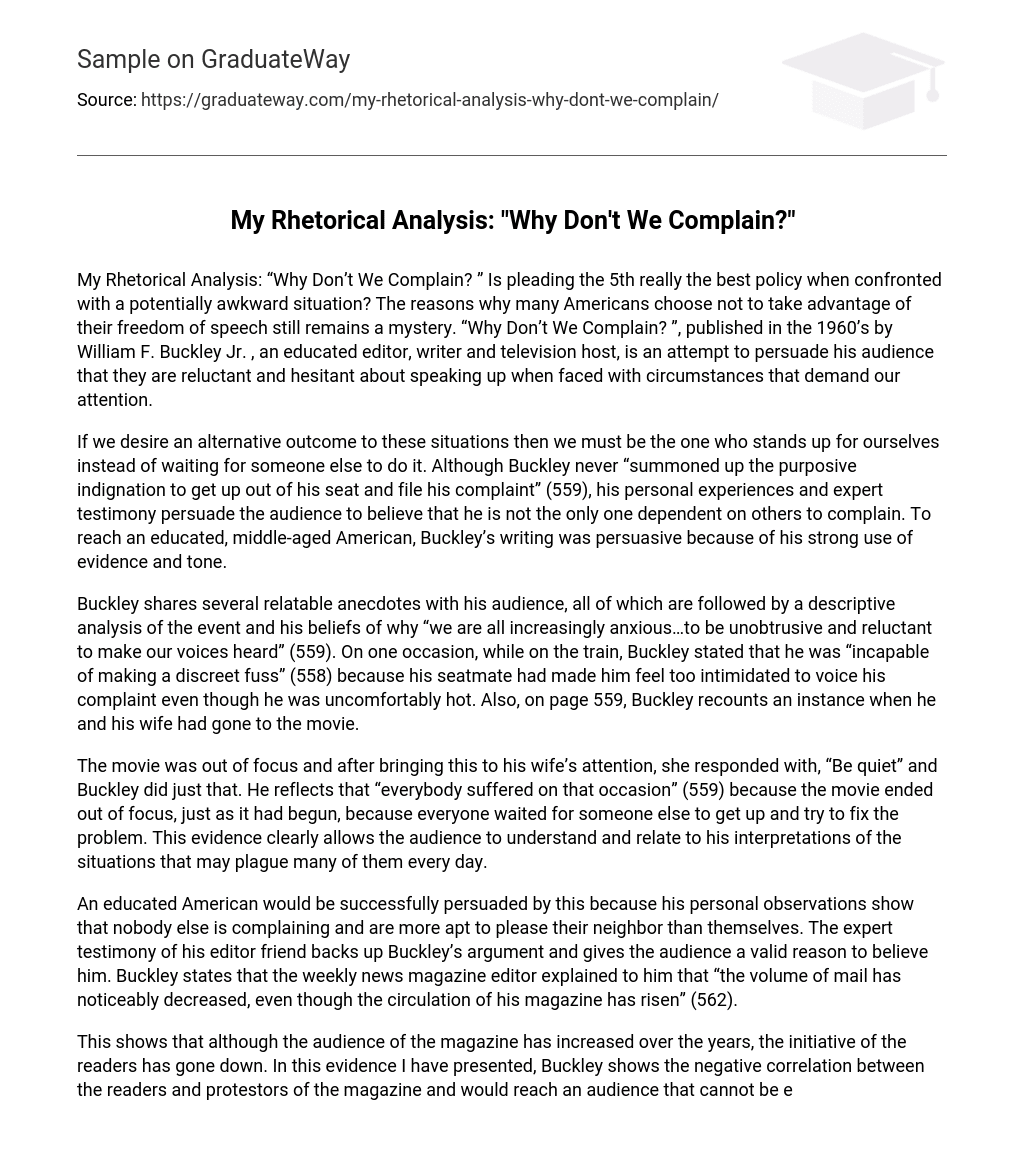My Rhetorical Analysis: “Why Don’t We Complain? ” Is pleading the 5th really the best policy when confronted with a potentially awkward situation? The reasons why many Americans choose not to take advantage of their freedom of speech still remains a mystery. “Why Don’t We Complain? ”, published in the 1960’s by William F. Buckley Jr. , an educated editor, writer and television host, is an attempt to persuade his audience that they are reluctant and hesitant about speaking up when faced with circumstances that demand our attention.
If we desire an alternative outcome to these situations then we must be the one who stands up for ourselves instead of waiting for someone else to do it. Although Buckley never “summoned up the purposive indignation to get up out of his seat and file his complaint” (559), his personal experiences and expert testimony persuade the audience to believe that he is not the only one dependent on others to complain. To reach an educated, middle-aged American, Buckley’s writing was persuasive because of his strong use of evidence and tone.
Buckley shares several relatable anecdotes with his audience, all of which are followed by a descriptive analysis of the event and his beliefs of why “we are all increasingly anxious…to be unobtrusive and reluctant to make our voices heard” (559). On one occasion, while on the train, Buckley stated that he was “incapable of making a discreet fuss” (558) because his seatmate had made him feel too intimidated to voice his complaint even though he was uncomfortably hot. Also, on page 559, Buckley recounts an instance when he and his wife had gone to the movie.
The movie was out of focus and after bringing this to his wife’s attention, she responded with, “Be quiet” and Buckley did just that. He reflects that “everybody suffered on that occasion” (559) because the movie ended out of focus, just as it had begun, because everyone waited for someone else to get up and try to fix the problem. This evidence clearly allows the audience to understand and relate to his interpretations of the situations that may plague many of them every day.
An educated American would be successfully persuaded by this because his personal observations show that nobody else is complaining and are more apt to please their neighbor than themselves. The expert testimony of his editor friend backs up Buckley’s argument and gives the audience a valid reason to believe him. Buckley states that the weekly news magazine editor explained to him that “the volume of mail has noticeably decreased, even though the circulation of his magazine has risen” (562).
This shows that although the audience of the magazine has increased over the years, the initiative of the readers has gone down. In this evidence I have presented, Buckley shows the negative correlation between the readers and protestors of the magazine and would reach an audience that cannot be easily persuade without hard facts. Buckley’s persuasive effort was successful by showing his audience that his argument is backed up by expert facts and it is not just his word that they have to believe.
Another strong piece of evidence that Buckley uses is when Premier Khrushchev of Russia visited the United States in 1959. The Cold War had taken many American lives in Korea and had cost billions of dollars in taxes, which the Americans were not happy about. Buckley uses this evidence to further persuade his audience that even in a time of war, they should be expected to protest against the cruelty of such executions. Buckley states that Premier Khrushchev was “primed, to experience the bitter resentment of the American people” (562).
After returning to Russia, Khrushchev reported to his people that “he had been met with overwhelming cordiality, except for a few fascists who followed me around with their wretched posters, and should be…horsewhipped” (562). In the evidence, Buckley is exposing the idleness of his audience to express their rights to protest and further persuades an American audience that they did not do their part in fighting for their constitutional rights by protesting against Khrushchev. The tone that is portrayed in Buckley’s essay is slightly sarcastic, but is also full of frustration.
Throughout the essay, he personalizes the argument with an informal, first person narration in order to reach the intended audience. Buckley’s sarcasm is obvious when he states that “we will sit in an oven or endure a racking headache before undertaking a head-on, I’m-here-to-tell-you-complaint” (559). This evidence proves that Buckley is making his point by drawing the reader in with these often humorous and uncomfortable situations and is easy enough for the average, frustrated American to appreciate.
This would work to convince an educated American because even though Buckley is being straight forward and sometimes blunt about his opinions, his tone is adding sarcasm and takes the edge off of the persuasion. Buckley effectively reached an educated American by providing strong evidence and using an appropriate tone. The personal experiences and expert testimony that have been presented were successful pieces of evidence that proved to Americans that they are not raising their voices when they need to. Buckley’s tone was also effective because he used a tone that an educated, middle-aged American would understand and not be offended by.
Hopefully, since 1960, America has resolved some of the issues that have caused them to be so passive and have not become increasingly muted. Griping can be positive when you are standing up for your rights. Future generations should be encouraged to raise their voices and join their fellow American’s in complaining about things that they feel are important. Works cited Buckley, Jr, William F. “Why Don’t We Complain? ” Readings for Writers. Ed. Jo Ray McCuen- Metherell and Anthony C. Winkler. Boston:Wadsworth, 2010. 557-562. Print.





